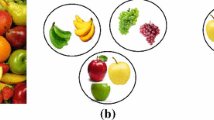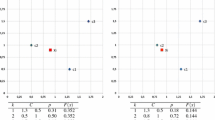Abstract
pLSA is a useful method to know the characteristics of customer or item in marketing. In this study, we proposed a method to set the initial values more efficiently than the existing method for the problem that the final solution depends on the initial values set in the EM algorithm used by pLSA to estimate the solutions. We focused on the dimensional compression and clustering that are the characteristics of pLSA, and thought that the stability of the solution of pLSA would be improved by reflecting it in the initial values. Therefore, first, we performed correspondence analysis and k-means cluster analysis on the original data to express the features of dimensional compression and clustering. Next, we compared the performance of the pLSA results with the initial values of the proposed method and the initial values of the conventional method using random numbers. As a result, it was shown that the proposed method also converges to the same log-likelihood as the conventional method, and that the proposed method is superior in terms of convergence speed and stability.
Access this chapter
Tax calculation will be finalised at checkout
Purchases are for personal use only
Similar content being viewed by others
References
Hoffman, T.: Probabilistic latent semantic analysis. In: Proceedings of Uncertainty in Artificial Intelligence, UAI 1999, pp. 289–296 (1999)
Analytics Design Lab Inc. pLSA (Probabilistic Latent Semantic Analysis), http://www.analyticsdlab.co.jp/column/plsa.html. Accessed 6 Feb 2021
Nishio, Y.: A latent class analysis using association between consumer values and behaviors. In: The 32nd Annual Conference of the Japanese Society for Artificial Intelligence (2018). (in Japanese)
Rindskopf, D.: Latent class analysis. In: The SAGE Handbook of Quantitative Methods in Psychology, Chap. 9, pp.199–216, SAGE Publication (2009)
Miwa, S.: Introduction to Latent Class Model. Theory Method (Jpn. Assoc. Math. Sociol.) 24(2), 345–356 (2009)
Deerwester, S., Dumais, S.T., Furnas, G.W., Landauer, T.K., Harshman, R.: Indexing by latent semantic analysis. J. Am. Soc. Inf. Sci. 41, 391–407 (1990)
Blei, D., Ng, A., Jordan, M.: Latent Dirichlet allocation. J. Mach. Learn. Res. 3, 993–1022 (2003)
MIERUCA ([Technical explanation] Latent semantic analysis (LSA)~From singular value decomposition (SVD) to document retrieval~), https://mieruca-ai.com/ai/lsa-lsi-svd/. Accessed 6 Feb 2021
Agricultural Information Science (LSI). https://axa.biopapyrus.jp/machine-learning/topic-model/lsi.html. Accessed 6 Feb 2021
MIERUCA ([Technical explanation] Algorithm and application of stochastic latent semantic analysis (PLSA)), https://mieruca-ai.com/ai/plsa/. Accessed 6 Feb 2021
Nakamura, N.: Data science learned in R 2 Multidimensional data analysis method. Kyoritsu Shuppan (2009)
Acknowledgement
This work was supported by JSPS KAKENHI Grant Number19K01945.
Author information
Authors and Affiliations
Editor information
Editors and Affiliations
Rights and permissions
Copyright information
© 2021 Springer Nature Switzerland AG
About this paper
Cite this paper
Terasawa, S., Otake, K., Namatame, T. (2021). Verification of Probabilistic Latent Semantic Analysis Clustering Solution Stability and Proposal of Optimal Initial Values Setting Method. In: Meiselwitz, G. (eds) Social Computing and Social Media: Applications in Marketing, Learning, and Health. HCII 2021. Lecture Notes in Computer Science(), vol 12775. Springer, Cham. https://doi.org/10.1007/978-3-030-77685-5_11
Download citation
DOI: https://doi.org/10.1007/978-3-030-77685-5_11
Published:
Publisher Name: Springer, Cham
Print ISBN: 978-3-030-77684-8
Online ISBN: 978-3-030-77685-5
eBook Packages: Computer ScienceComputer Science (R0)




